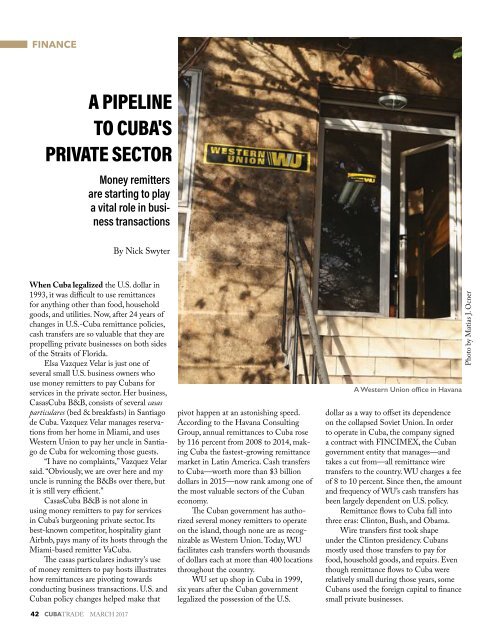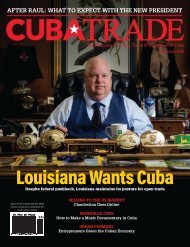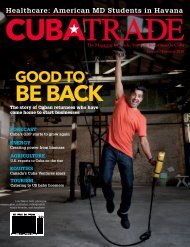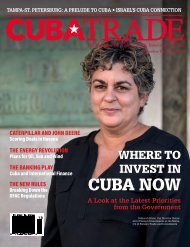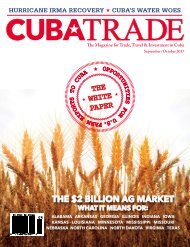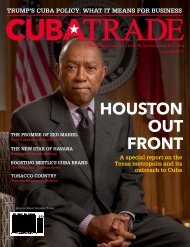Create successful ePaper yourself
Turn your PDF publications into a flip-book with our unique Google optimized e-Paper software.
FINANCE<br />
A PIPELINE<br />
TO CUBA'S<br />
PRIVATE SECTOR<br />
Money remitters<br />
are starting to play<br />
a vital role in business<br />
transactions<br />
By Nick Swyter<br />
When Cuba legalized the U.S. dollar in<br />
1993, it was difficult to use remittances<br />
for anything other than food, household<br />
goods, and utilities. Now, after 24 years of<br />
changes in U.S.-Cuba remittance policies,<br />
cash transfers are so valuable that they are<br />
propelling private businesses on both sides<br />
of the Straits of Florida.<br />
Elsa Vazquez Velar is just one of<br />
several small U.S. business owners who<br />
use money remitters to pay Cubans for<br />
services in the private sector. Her business,<br />
CasasCuba B&B, consists of several casas<br />
particulares (bed & breakfasts) in Santiago<br />
de Cuba. Vazquez Velar manages reservations<br />
from her home in Miami, and uses<br />
Western Union to pay her uncle in Santiago<br />
de Cuba for welcoming those guests.<br />
“I have no complaints,” Vazquez Velar<br />
said. “Obviously, we are over here and my<br />
uncle is running the B&Bs over there, but<br />
it is still very efficient.”<br />
CasasCuba B&B is not alone in<br />
using money remitters to pay for services<br />
in Cuba’s burgeoning private sector. Its<br />
best-known competitor, hospitality giant<br />
Airbnb, pays many of its hosts through the<br />
Miami-based remitter VaCuba.<br />
The casas particulares industry's use<br />
of money remitters to pay hosts illustrates<br />
how remittances are pivoting towards<br />
conducting business transactions. U.S. and<br />
Cuban policy changes helped make that<br />
42 CUBATRADE MARCH 2017<br />
pivot happen at an astonishing speed.<br />
According to the Havana Consulting<br />
Group, annual remittances to Cuba rose<br />
by 116 percent from 2008 to 2014, making<br />
Cuba the fastest-growing remittance<br />
market in Latin America. Cash transfers<br />
to Cuba––worth more than $3 billion<br />
dollars in 2015—now rank among one of<br />
the most valuable sectors of the Cuban<br />
economy.<br />
The Cuban government has authorized<br />
several money remitters to operate<br />
on the island, though none are as recognizable<br />
as Western Union. Today, WU<br />
facilitates cash transfers worth thousands<br />
of dollars each at more than 400 locations<br />
throughout the country.<br />
WU set up shop in Cuba in 1999,<br />
six years after the Cuban government<br />
legalized the possession of the U.S.<br />
A Western Union office in Havana<br />
dollar as a way to offset its dependence<br />
on the collapsed Soviet Union. In order<br />
to operate in Cuba, the company signed<br />
a contract with FINCIMEX, the Cuban<br />
government entity that manages—and<br />
takes a cut from—all remittance wire<br />
transfers to the country. WU charges a fee<br />
of 8 to 10 percent. Since then, the amount<br />
and frequency of WU’s cash transfers has<br />
been largely dependent on U.S. policy.<br />
Remittance flows to Cuba fall into<br />
three eras: Clinton, Bush, and Obama.<br />
Wire transfers first took shape<br />
under the Clinton presidency. Cubans<br />
mostly used those transfers to pay for<br />
food, household goods, and repairs. Even<br />
though remittance flows to Cuba were<br />
relatively small during those years, some<br />
Cubans used the foreign capital to finance<br />
small private businesses.<br />
Photo by Matias J. Ocner


